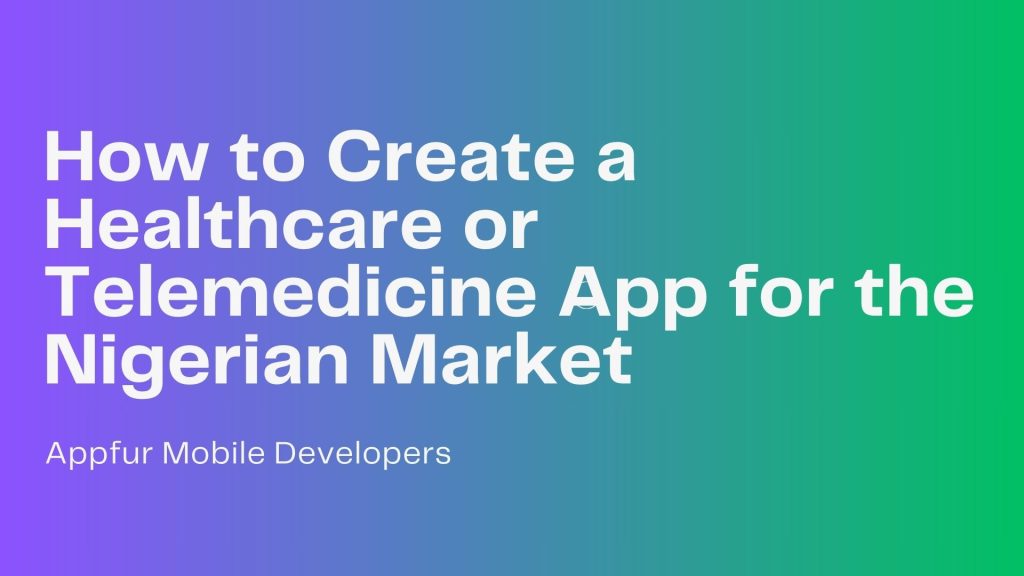Did you know that over 60% of Nigerians face difficulty accessing timely healthcare due to long queues, poor hospital infrastructure, or distance from medical centers? Yet, smartphone penetration is soaring — creating the perfect environment for telemedicine apps and digital healthcare platforms to transform lives.
Whether you’re a doctor, healthtech startup, or hospital administrator, building a healthcare app can help solve real access problems for patients in Nigeria while also creating a sustainable business model.
Here’s how to get started.

Step 1: Define Your Healthcare App’s Core Purpose
Not all health apps are the same. Decide on your focus:
- Telemedicine App – Online consultations with doctors
- Hospital/Clinic App – Booking, records, prescriptions
- Pharmacy App – Medication ordering and delivery
- Health Tracker App – Blood pressure, sugar, menstrual cycle, etc.
- Emergency Response App – Ambulance call-outs, crisis help
- Mental Health App – Counseling, therapy sessions, resources
The clearer your core goal, the easier it will be to design a useful, compliant solution.
Step 2: Include Essential Features for Nigerian Users
To serve users effectively in Nigeria, your app must be simple, low on data, trustworthy, and easy to navigate.
Key features to include:
- Doctor profiles with ratings and specialties
- Appointment booking system (video, audio, or chat)
- E-prescription generation
- Health record upload (lab tests, scans)
- Secure payment system (Paystack, Flutterwave)
- Push reminders for medication and follow-ups
- Multilingual support (especially Yoruba, Hausa, Igbo if possible)
- Live chat for triage or admin inquiries
- Offline record viewing (for poor network areas)
If you’re building a women-focused or child-focused health app, personalize features accordingly.
Step 3: Prioritize Data Security and Compliance
Health data is extremely sensitive. Build with the following in mind:
- User authentication via PIN, fingerprint, or OTP
- End-to-end encryption for consultations
- Secure cloud storage with HIPAA-compliant services if storing abroad
- Consent forms and privacy notices
- Role-based access for doctors, admins, and users
You must also comply with Nigeria’s NDPR (Nigeria Data Protection Regulation). Be transparent about how you collect, store, and use patient data.
Step 4: Design for Trust and Simplicity
Healthcare apps must feel reliable, clean, and reassuring. Avoid anything that seems gimmicky or complicated.
Design tips:
- Use calm colors like white, blue, or green
- Show profile images of real doctors, with licenses and qualifications
- Keep booking and consultation steps within three taps
- Add visible “Verified Doctor” badges
- Use clear labels and large fonts
- Make navigation intuitive and smooth
Trust is everything in health tech — especially in Nigeria where skepticism is high.
Step 5: Choose a Scalable Technology Stack
Appfur recommends the following stack for Nigerian health apps:
- Flutter for Android and iOS apps
- Firebase or Node.js for backend and real-time updates
- Agora SDK for secure video consultations
- Cloud Firestore or MongoDB Atlas for medical records
- Twilio or Termii API for SMS and appointment alerts
- Paystack or Flutterwave for secure payments
Make sure your infrastructure can scale quickly if usage increases, especially during health emergencies or outbreaks.
Step 6: Monetization Models for Healthcare Apps
There are several ways to make the app profitable while still offering value:
- Pay-per-consultation model, such as ₦1,000 to ₦5,000 per session
- Subscription plans for unlimited monthly checkups
- Corporate partnerships with HMOs or companies
- In-app pharmacy integration and delivery charges
- Sponsored health content or ads from verified health brands
- Tiered pricing — free general practitioners and paid specialists
Choose a model that aligns with the economic realities of your target users.
Step 7: Marketing Your App in Nigeria
To gain traction, focus on trust-building and community education.
Effective tactics include:
- Collaborating with trusted Nigerian doctors on Instagram or TikTok
- Sharing testimonials of lives saved or improved
- Offering a “Free First Consultation” promo
- Partnering with NGOs or HMOs for outreach
- Creating YouTube videos or reels explaining common health issues and how your app helps
- Targeting parenting groups, women’s groups, and rural community health initiatives
Your marketing should be compassionate, clear, and credible.
Final Thoughts
Nigeria’s healthcare system is overstretched, and millions of people are still underserved. Your healthcare app could bridge the gap between patients and professionals, saving time, money, and lives.
At Appfur Nigeria, we specialize in building secure, impactful healthcare apps for startups, hospitals, and solo health professionals. From video consultations to lab result integrations, we build with empathy, speed, and compliance in mind.
We design and build high-quality, scalable mobile apps tailored to your needs.
Let’s talk! Message us on WhatsApp now: Click Here
Your next big app starts here!
